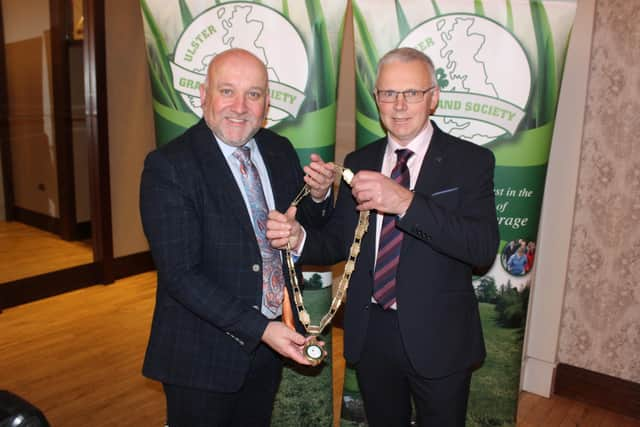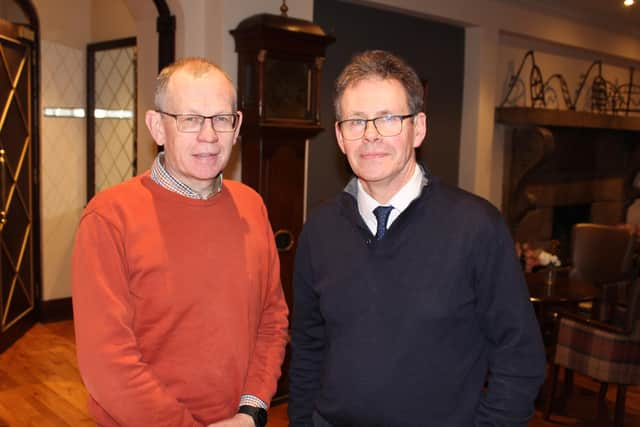Ulster Grassland Society has a Co Fermanagh president
and live on Freeview channel 276
He took up his new role, succeeding Colin Linton, at the recent 2024 UGS conference.
The Ulster Grassland Society brings together farmers, advisers, lecturers, researchers and technical members of the agricultural industry and is the biggest grassland society within the UK with around 500 members.
Advertisement
Advertisement
John farms with three sons, all of whom are committed to a full time career in agriculture. Their business comprises three enterprises: a suckler herd, a lowland sheep flock and a calf rearing unit, managed to Blde Farming standards.


Previously, the Egertons had also contract-reared replacement heifers for neighbouring dairy farmers.
However, the growing threat of bovine tuberculosis (bTB) had severely restricted this operation.
As a consequence, they switched to finishing a number of the weanlings that come through the calf rearing unit.
Advertisement
Advertisement
The suckler herd is split equally into spring and autumn calving groups.


The decision to push ahead with the calf rearing business was based on the fact that the enterprise does not impact on the total land area within the business.
The plan is to develop an additional rearing unit within the foreseeable future.
John Egerton explained:
“Our plan is to develop three viable farming businesses over the coming years, focussing on the land area current available to us.”
Advertisement
Advertisement
Courtesy of his presentation to the conference, Egerton highlighted the key role that agriculture will play in responding to the challenge of climate change.
He said:“Farming is not part of the problem: it is a actually a key part of the solution. And farmers must be supported accordingly.”
Egerton continued:
“But environmental sustainability will only be achieved once farmers are allowed to make a living from their own businesses.
“Farmers do not want to make fortunes from their businesses. But they must be in a position where they can pay their bills and look to the future with a degree of confidence.”
Advertisement
Advertisement
Egerton went on to highlight the role already being played by the ARCZero project in helping to deliver a sustainable future for agriculture in Northern Ireland.
He is one of seven farmers actively involved in the scheme. It was established two years ago to measure and actively manage carbon flows at the individual farm level
The incoming UGS president also highlighted the issues caused by bTB on a growing number of livestock farms throughout Northern Ireland.
Egerton also wants to see the issue of succession within farming families and businesses made a greater priority within Northern Ireland.
Advertisement
Advertisement
He specifically highlighted the specific challenges this had created within his own family.
Building resilience into a beef enterprise
The main driver of the Egerton operation is a 90-strong suckler herd, which is equally split into spring and autumn calving groups.
Optimising production from grass and making use of the best possible suckler genetics are priorities for the business.
John explained:
“It rains a lot in Co Fermanagh. So calving 90 cows in one block during the spring months is not an option.
Advertisement
Advertisement
“If ground starts to cut up during the summer, we can take the autumn calving group indoors without interrupting the overall operation of the farm.
“The spring calving group calve down during March and April: the autumn group clave down during August and September.”
John uses a significant proportion of sexed semen on all the cows and breeding heifers.
He commented:“Only maternal sires are used on the stock. Each animal will receive up to two AI straws. Any not in calf by that stage are sold on.
Advertisement
Advertisement
“We breed all our herd replacements. Surplus breeding heifers are sold as herd replacements to other suckler farmers.
“The spring and autumn calving groups are kept entirely separate. For the most part, the cows comprise a mix of Simmental, Salers and Limousin bloodlines. All our heifers are calved at 24 months."
A paddock grazing system is at the heart of the Egertons’ commitment to grassland management.
A 40-acre block provides sufficient grazing for over 90 head of cattle.
Advertisement
Advertisement
“There would normally be surplus grass available to allow me make 80 silage bales,” John added.
“Back in my father’s day, the same block of land was set stocked with 25 cattle.”
John concluded:“Building resilience within a business is all about making best use of everyone’s time.”
The issue of succession must be discussed regularly within farm families
Advertisement
Advertisement
Not enough farm families openly discuss the issue of succession, according to ‘agricultural mentor’ Heather Wildman.
The Nuffield Scholar addressed the 2024 Ulster Grassland Society (UGS) conference, focussing on the issue of transition within farm families.
She pointed out that six issues drive change within a farm business. These are: death, disaster, divorce, disease, disability and divorce.
“So it’s important that sufficient planning has been put in place to meet any of these challenges, should and when they arise,” she said.
Advertisement
Advertisement
“Open communication involving everyone working within a business is critically important. This process should include regular meetings with everyone involved. If necessary, minutes of these minutes should be taken and agreed.”
Wildman added:
“The basic starting point to any discussion on farm succession is the identification of all the people with a shareholding in the business.
“And this includes those people who are not actively involved on a daily basis. It’s not unknown for family members living in other countries to have been bequeathed an interest in a farming business by a previous generation.”
Wildman confirmed that succession is a long-term process. She further explained:
Advertisement
Advertisement
“But it must have outcomes that meet the expectations of everyone involved.
“In the case of some people this may include a plan to get out of the business in order to look at other career options. Retirement planning is also important.”
According to Wildman getting the professional advice required to help put a succession plan to together is very important. People involved here will include solicitors, accountants, bank manager.
“If necessary, it might also prove useful to include representatives of those businesses the farm deals with on a regular basis.
Advertisement
Advertisement
“Getting professional advice at an early stage can also save money.
"Actively involving an accountant or solicitor to assist in the development of a succession plan can cost relatively little as opposed to the large sums involved when these professional are engaged in the wake of an unplanned sudden death or divorce.”
Having an accurate knowledge of the assets and debts that relate to a farm business is a fundamental driver for any discussion on farm succession.
“Having an agreed structure for the business is also important,” Wildman commented.
Advertisement
Advertisement
“Farms can be set up as sole trading operations, partnerships or companies limited by guarantee.
“Where partnerships are concerned, a legally-recognised agreement should be established.”
She concluded:
“Everyone working within a farm business should make a will, which can be changed as and when required.
“The appointment of a living power of attorney is also strongly advised.”
Advertisement
Advertisement
Simply throwing money at retirement schemes will not deliver generational change
Older farmers must be given their sense of place when it comes to addressing the challenge of generational change with Irish agriculture.
This was the clear view expressed by University of Galway academic, Dr Shane Conway, courtesy of his presentation to the 2024 Ulster Grassland Society (UGS) annual conference.
His research has confirmed the key role that farmers play within all rural communities.
He explained:
Advertisement
Advertisement
“Farmers and their families remain a critically important component of rural life throughout Ireland.
“And this fundamental point must be recognised by governments and society as a whole.”
Conway added:
“Many farmers feel they don’t want nor need to retire, once they reach 65 or 66 years-of-age.
“They feel they still have lots to offer. And this is absolutely correct. There is no substitute for experience.
Advertisement
Advertisement
“So for a government simply to push ahead with a finance-heavy retirement package is not the right approach to take when it comes to dealing with the issue of farm succession.”
Conway was referring to attempts made by previous Irish governments to push ahead with farm pension schemes.
However, he added that the policy makers of the time were not deliberately setting out to marginalise older farmers at the time.
“It was simply a case of society not being fully aware at the time of the social needs and continuing life-related goals of older farmers.”
Advertisement
Advertisement
According to Conway, future policy decisions – where generational renewal within agriculture is concerned – must focus on the needs of entire farming communities.
He commented:
“The need to actively address the issue of farm succession is obvious. Currently one-third of farmers in the European are 65 years-of age and older.
“Meanwhile, only 5.6% of European farmers are 35 years-of-age or younger.”
The University of Galway representative views greater social inclusion as being key to achieving a more structured approach to the issue of generational change within agriculture.
Advertisement
Advertisement
“Policy must be developed from the farmers’ point of view,” he stressed.
Casey’s rural studies’ research has involved his active communication with 555 farmers, all 55 years-of age and over.
“The farmers in question all participate in Teagasc’s farm data research programme,” he commented.”
One of the most significant conclusions arising from Casey’s work, up to this point is the future role of livestock marts as social hubs across the across the country
Advertisement
Advertisement
“The success of the Farmers’ Yard project is already confirming this,” he added.
“Social interaction in later life is critically important. Marts are widely recognised by older farmers as a safe place for them to be.
“But it’s up to mart operators to add to this experience. The objective is to deliver a better quality of life for older farmers.”
The establishment of a national social organisation for older farmers also has the potential to create an age-friendly environment in the farming sector.
Advertisement
Advertisement
The concept of age-friendly environments has garnered international attention among researchers, policy makers and community organisations since the World Health Organization launched its Global Age-friendly Cities and Communities project in 2006.
In addition to their primary function of providing a consistent, stable and transparent method of buying and selling livestock through a guaranteed payment structure, marts also provide a vital social facility for the farming community, some of whom have no other social outlet.
Many older farmers rely on their weekly visit to the mart to meet friends, exchange ideas and catch up on local news in an informal setting.
This has almost grown in significance in recent years as many of the natural meeting points within rural communities have been removed due to the closure of post offices, pubs and local shops.
Shane Casey concluded:
“And by taking this approach, marts can also help to justify their own existence into the future.”